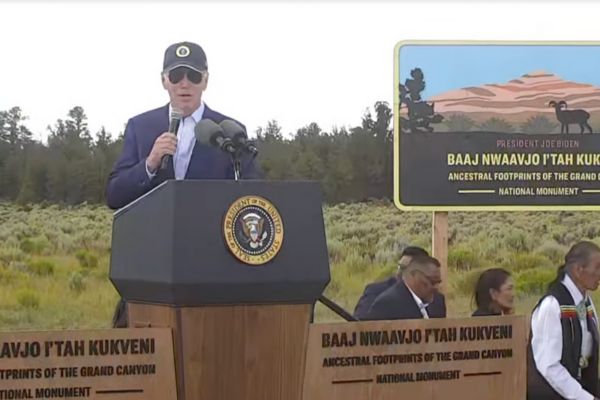
- Details
- By Darren Thompson
The newly designated Baaj Nwaavjo I’tah Kukveni Grand Canyon National Monument in northern Arizona does not prohibit mining as touted. Rather, all valid existing rights to minerals within the monument, including uranium, will be preserved, White House officials told Bloomberg.
One of the main rallying points to designating nearly one million acres of greater Grand Canyon landscape sacred to tribal nations and Indigenous peoples was to protect the region from mining.
The designation came less than a month after the U.S. Bureau of Land Management (BLM) and the U.S. Forest Service (USFS) hosted a public meeting on July 18, where citizens commented to leaders from federal agencies about the proposed monument.
Many tribes said in press releases that the new monument’s designation prohibits mining within its boundaries.
However, the designation doesn’t block the permitted uranium and other precious metals mines in the region, such as copper. Energy Fuels Inc. said in an interview with Native News Online that it plans to proceed with mining uranium at its existing Pinyon Plain Mine.
“All National Monuments are subject to valid existing rights,” said Energy Fuels’ Vice President of Marketing and Corporate Development Curtis Moore in an interview with Native News Online.
Moore said that the company’s mine has valid existing rights that have been affirmed by federal courts.
“Future projects are probably much more in question,” Moore said. The mine is expected to operate in the next couple of years, and once it begins mining it will only operate for a few years, Moore said. After the resource is depleted, Moore said, the company plans to reclaim the land the way it was before mining.
Tribes did not respond to Native News Online requests for comment.
Energy Fuels Inc.’s shareholder reports can be viewed here.
More Stories Like This
Trump signs law that revokes some limits on drilling in Alaska’s National Petroleum ReserveSouthern Sierra Miwuk Nation Gets 900-Acres ofLand Back
Chilkat Indian Village Tells New Palmer Mine Owners They Are “Not Welcome” in Chilkat Valley
Tribes, Coastal Group Ask Army Corps to Revoke Permit for Texas Export Terminal
Michigan Tribes Tell Supreme Court: Don’t Bail Out Enbridge
Help us defend tribal sovereignty.
At Native News Online, our mission is rooted in telling the stories that strengthen sovereignty and uplift Indigenous voices — not just at year’s end, but every single day.
Because of your generosity last year, we were able to keep our reporters on the ground in tribal communities, at national gatherings and in the halls of Congress — covering the issues that matter most to Indian Country: sovereignty, culture, education, health and economic opportunity.
That support sustained us through a tough year in 2025. Now, as we look to the year ahead, we need your help right now to ensure warrior journalism remains strong — reporting that defends tribal sovereignty, amplifies Native truth, and holds power accountable.
 The stakes couldn't be higher. Your support keeps Native voices heard, Native stories told and Native sovereignty defended.
The stakes couldn't be higher. Your support keeps Native voices heard, Native stories told and Native sovereignty defended.
Stand with Warrior Journalism today.
Levi Rickert (Potawatomi), Editor & Publisher

